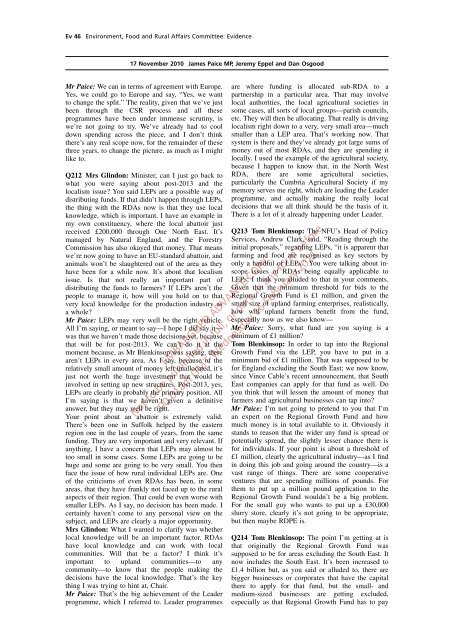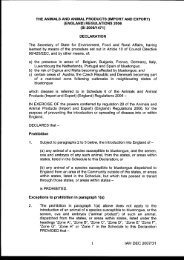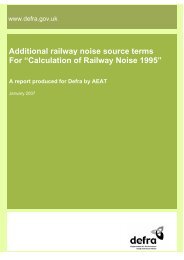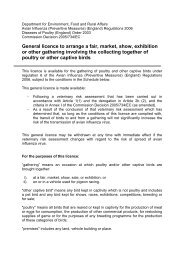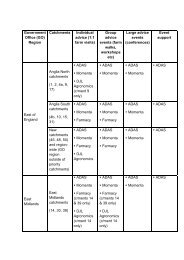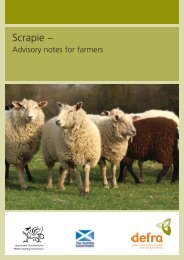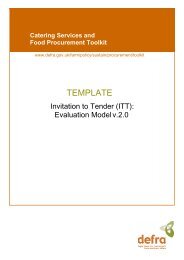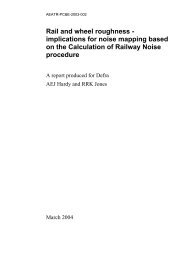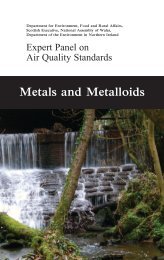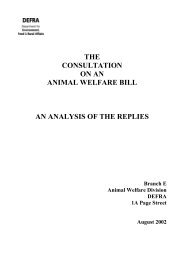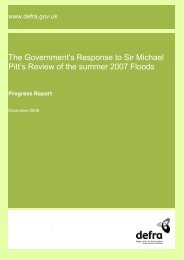Farming in the Uplands - ARCHIVE: Defra
Farming in the Uplands - ARCHIVE: Defra
Farming in the Uplands - ARCHIVE: Defra
You also want an ePaper? Increase the reach of your titles
YUMPU automatically turns print PDFs into web optimized ePapers that Google loves.
Ev 46 Environment, Food and Rural Affairs Committee: Evidence<br />
17 November 2010 James Paice MP, Jeremy Eppel and Dan Osgood<br />
Mr Paice: We can <strong>in</strong> terms of agreement with Europe.<br />
Yes, we could go to Europe and say, “Yes, we want<br />
to change <strong>the</strong> split.” The reality, given that we’ve just<br />
been through <strong>the</strong> CSR process and all <strong>the</strong>se<br />
programmes have been under immense scrut<strong>in</strong>y, is<br />
we’re not go<strong>in</strong>g to try. We’ve already had to cool<br />
down spend<strong>in</strong>g across <strong>the</strong> piece, and I don’t th<strong>in</strong>k<br />
<strong>the</strong>re’s any real scope now, for <strong>the</strong> rema<strong>in</strong>der of <strong>the</strong>se<br />
three years, to change <strong>the</strong> picture, as much as I might<br />
like to.<br />
Q212 Mrs Gl<strong>in</strong>don: M<strong>in</strong>ister, can I just go back to<br />
what you were say<strong>in</strong>g about post-2013 and <strong>the</strong><br />
localism issue? You said LEPs are a possible way of<br />
distribut<strong>in</strong>g funds. If that didn’t happen through LEPs,<br />
<strong>the</strong> th<strong>in</strong>g with <strong>the</strong> RDAs now is that <strong>the</strong>y use local<br />
knowledge, which is important. I have an example <strong>in</strong><br />
my own constituency, where <strong>the</strong> local abattoir just<br />
received £200,000 through One North East. It’s<br />
managed by Natural England, and <strong>the</strong> Forestry<br />
Commission has also okayed that money. That means<br />
we’re now go<strong>in</strong>g to have an EU-standard abattoir, and<br />
animals won’t be slaughtered out of <strong>the</strong> area as <strong>the</strong>y<br />
have been for a while now. It’s about that localism<br />
issue. Is that not really an important part of<br />
distribut<strong>in</strong>g <strong>the</strong> funds to farmers? If LEPs aren’t <strong>the</strong><br />
people to manage it, how will you hold on to that<br />
very local knowledge for <strong>the</strong> production <strong>in</strong>dustry as<br />
a whole?<br />
Mr Paice: LEPs may very well be <strong>the</strong> right vehicle.<br />
All I’m say<strong>in</strong>g, or meant to say—I hope I did say it—<br />
was that we haven’t made those decisions yet, because<br />
that will be for post-2013. We can’t do it at <strong>the</strong><br />
moment because, as Mr Blenk<strong>in</strong>sop was say<strong>in</strong>g, <strong>the</strong>re<br />
aren’t LEPs <strong>in</strong> every area. As I say, because of <strong>the</strong><br />
relatively small amount of money left unallocated, it’s<br />
just not worth <strong>the</strong> huge <strong>in</strong>vestment that would be<br />
<strong>in</strong>volved <strong>in</strong> sett<strong>in</strong>g up new structures. Post-2013, yes,<br />
LEPs are clearly <strong>in</strong> probably <strong>the</strong> primary position. All<br />
I’m say<strong>in</strong>g is that we haven’t given a def<strong>in</strong>itive<br />
answer, but <strong>the</strong>y may well be right.<br />
Your po<strong>in</strong>t about an abattoir is extremely valid.<br />
There’s been one <strong>in</strong> Suffolk helped by <strong>the</strong> eastern<br />
region one <strong>in</strong> <strong>the</strong> last couple of years, from <strong>the</strong> same<br />
fund<strong>in</strong>g. They are very important and very relevant. If<br />
anyth<strong>in</strong>g, I have a concern that LEPs may almost be<br />
too small <strong>in</strong> some cases. Some LEPs are go<strong>in</strong>g to be<br />
huge and some are go<strong>in</strong>g to be very small. You <strong>the</strong>n<br />
face <strong>the</strong> issue of how rural <strong>in</strong>dividual LEPs are. One<br />
of <strong>the</strong> criticisms of even RDAs has been, <strong>in</strong> some<br />
areas, that <strong>the</strong>y have frankly not faced up to <strong>the</strong> rural<br />
aspects of <strong>the</strong>ir region. That could be even worse with<br />
smaller LEPs. As I say, no decision has been made. I<br />
certa<strong>in</strong>ly haven’t come to any personal view on <strong>the</strong><br />
subject, and LEPs are clearly a major opportunity.<br />
Mrs Gl<strong>in</strong>don: What I wanted to clarify was whe<strong>the</strong>r<br />
local knowledge will be an important factor. RDAs<br />
have local knowledge and can work with local<br />
communities. Will that be a factor? I th<strong>in</strong>k it’s<br />
important to upland communities—to any<br />
community—to know that <strong>the</strong> people mak<strong>in</strong>g <strong>the</strong><br />
decisions have <strong>the</strong> local knowledge. That’s <strong>the</strong> key<br />
th<strong>in</strong>g I was try<strong>in</strong>g to h<strong>in</strong>t at, Chair.<br />
Mr Paice: That’s <strong>the</strong> big achievement of <strong>the</strong> Leader<br />
programme, which I referred to. Leader programmes<br />
are where fund<strong>in</strong>g is allocated sub-RDA to a<br />
partnership <strong>in</strong> a particular area. That may <strong>in</strong>volve<br />
local authorities, <strong>the</strong> local agricultural societies <strong>in</strong><br />
some cases, all sorts of local groups—parish councils,<br />
etc. They will <strong>the</strong>n be allocat<strong>in</strong>g. That really is driv<strong>in</strong>g<br />
localism right down to a very, very small area—much<br />
smaller than a LEP area. That’s work<strong>in</strong>g now. That<br />
system is <strong>the</strong>re and <strong>the</strong>y’ve already got large sums of<br />
money out of most RDAs, and <strong>the</strong>y are spend<strong>in</strong>g it<br />
locally. I used <strong>the</strong> example of <strong>the</strong> agricultural society,<br />
because I happen to know that, <strong>in</strong> <strong>the</strong> North West<br />
RDA, <strong>the</strong>re are some agricultural societies,<br />
particularly <strong>the</strong> Cumbria Agricultural Society if my<br />
memory serves me right, which are lead<strong>in</strong>g <strong>the</strong> Leader<br />
programme, and actually mak<strong>in</strong>g <strong>the</strong> really local<br />
decisions that we all th<strong>in</strong>k should be <strong>the</strong> basis of it.<br />
There is a lot of it already happen<strong>in</strong>g under Leader.<br />
Q213 Tom Blenk<strong>in</strong>sop: The NFU’s Head of Policy<br />
Services, Andrew Clark, said, “Read<strong>in</strong>g through <strong>the</strong><br />
<strong>in</strong>itial proposals,” regard<strong>in</strong>g LEPs, “it is apparent that<br />
farm<strong>in</strong>g and food are recognised as key sectors by<br />
only a handful of LEPs.” You were talk<strong>in</strong>g about <strong>in</strong>scope<br />
issues of RDAs be<strong>in</strong>g equally applicable to<br />
LEPs; I th<strong>in</strong>k you alluded to that <strong>in</strong> your comments.<br />
Given that <strong>the</strong> m<strong>in</strong>imum threshold for bids to <strong>the</strong><br />
Regional Growth Fund is £1 million, and given <strong>the</strong><br />
small size of upland farm<strong>in</strong>g enterprises, realistically,<br />
how will upland farmers benefit from <strong>the</strong> fund,<br />
especially now as we also know—<br />
Mr Paice: Sorry, what fund are you say<strong>in</strong>g is a<br />
m<strong>in</strong>imum of £1 million?<br />
Tom Blenk<strong>in</strong>sop: In order to tap <strong>in</strong>to <strong>the</strong> Regional<br />
Growth Fund via <strong>the</strong> LEP, you have to put <strong>in</strong> a<br />
m<strong>in</strong>imum bid of £1 million. That was supposed to be<br />
for England exclud<strong>in</strong>g <strong>the</strong> South East; we now know,<br />
s<strong>in</strong>ce V<strong>in</strong>ce Cable’s recent announcement, that South<br />
East companies can apply for that fund as well. Do<br />
you th<strong>in</strong>k that will lessen <strong>the</strong> amount of money that<br />
farmers and agricultural bus<strong>in</strong>esses can tap <strong>in</strong>to?<br />
Mr Paice: I’m not go<strong>in</strong>g to pretend to you that I’m<br />
an expert on <strong>the</strong> Regional Growth Fund and how<br />
much money is <strong>in</strong> total available to it. Obviously it<br />
stands to reason that <strong>the</strong> wider any fund is spread or<br />
potentially spread, <strong>the</strong> slightly lesser chance <strong>the</strong>re is<br />
for <strong>in</strong>dividuals. If your po<strong>in</strong>t is about a threshold of<br />
£1 million, clearly <strong>the</strong> agricultural <strong>in</strong>dustry—as I f<strong>in</strong>d<br />
<strong>in</strong> do<strong>in</strong>g this job and go<strong>in</strong>g around <strong>the</strong> country—is a<br />
vast range of th<strong>in</strong>gs. There are some cooperative<br />
ventures that are spend<strong>in</strong>g millions of pounds. For<br />
<strong>the</strong>m to put up a million pound application to <strong>the</strong><br />
Regional Growth Fund wouldn’t be a big problem.<br />
For <strong>the</strong> small guy who wants to put up a £30,000<br />
slurry store, clearly it’s not go<strong>in</strong>g to be appropriate,<br />
but <strong>the</strong>n maybe RDPE is.<br />
EMBARGOED ADVANCE COPY:<br />
Not to be published <strong>in</strong> full, or part, <strong>in</strong> any form before<br />
00.01am GMT Wednesday 16 February 2011<br />
Q214 Tom Blenk<strong>in</strong>sop: The po<strong>in</strong>t I’m gett<strong>in</strong>g at is<br />
that orig<strong>in</strong>ally <strong>the</strong> Regional Growth Fund was<br />
supposed to be for areas exclud<strong>in</strong>g <strong>the</strong> South East. It<br />
now <strong>in</strong>cludes <strong>the</strong> South East. It’s been <strong>in</strong>creased to<br />
£1.4 billion but, as you said or alluded to, <strong>the</strong>re are<br />
bigger bus<strong>in</strong>esses or corporates that have <strong>the</strong> capital<br />
<strong>the</strong>re to apply for that fund, but <strong>the</strong> small- and<br />
medium-sized bus<strong>in</strong>esses are gett<strong>in</strong>g excluded,<br />
especially as that Regional Growth Fund has to pay


